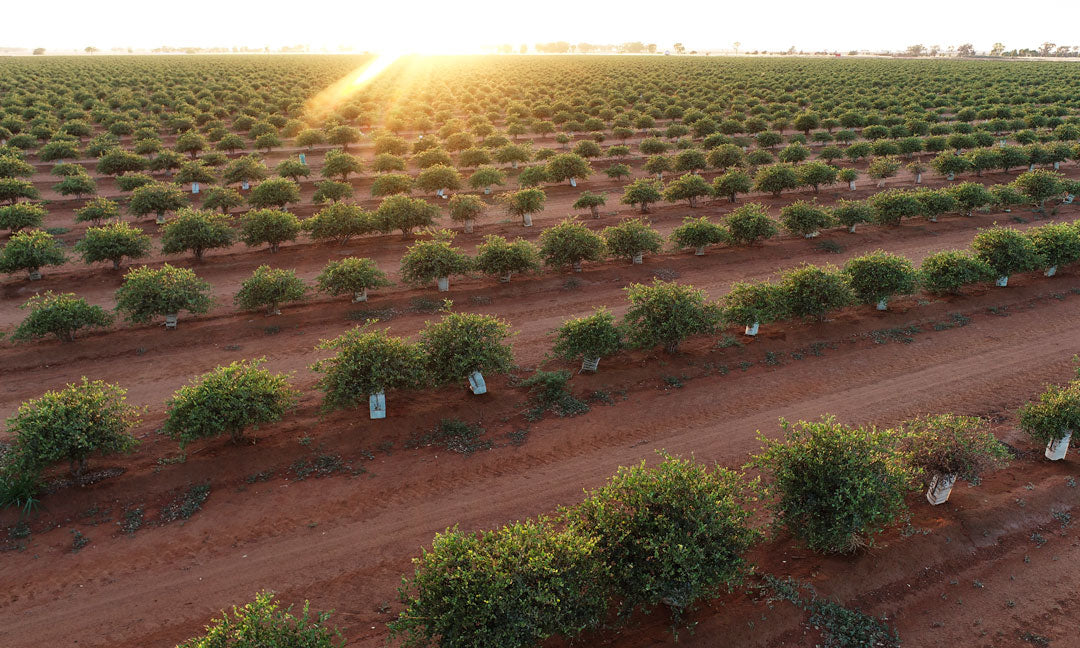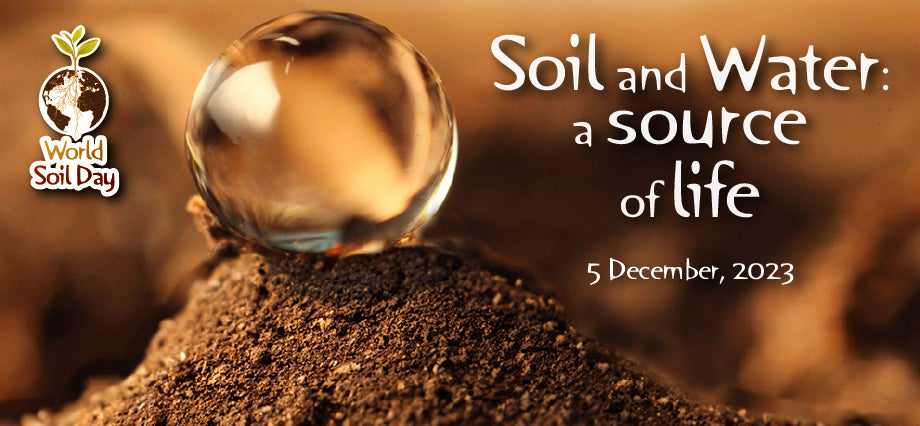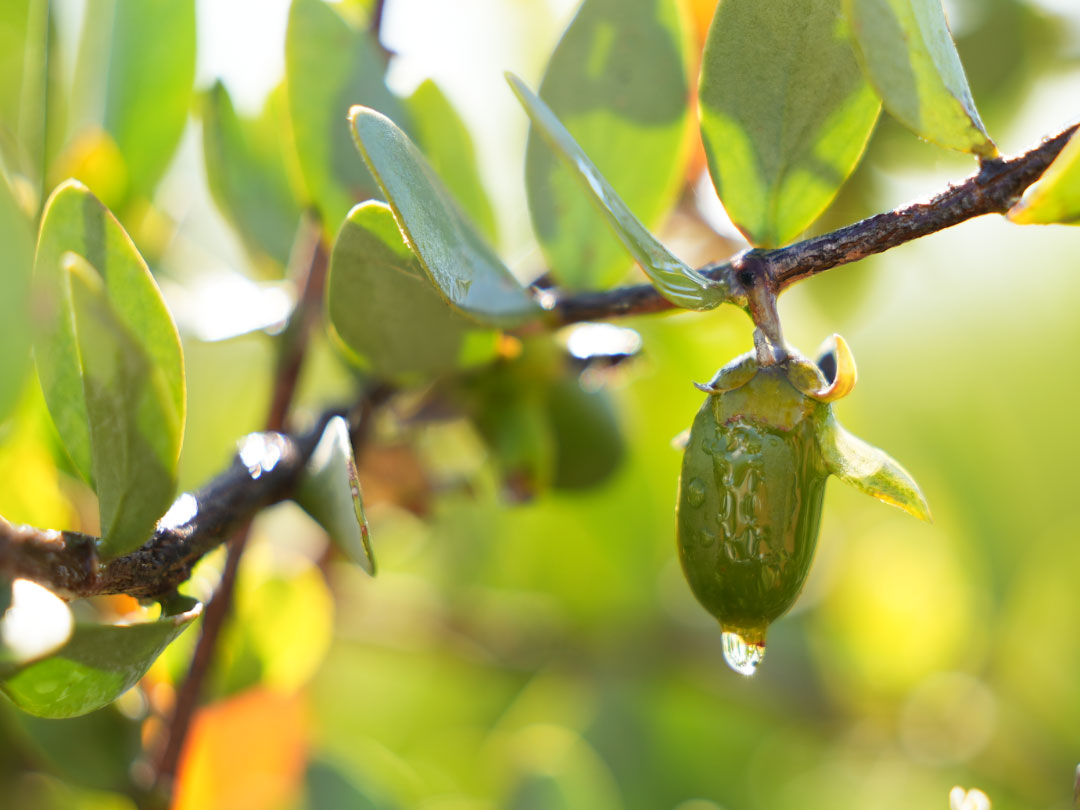Australian Jojoba 1.5mL with every order
Sustainability at The Jojoba Company, How We Protect Our Soil

Celebrating World Soil Day
It's a priority for us to keep the soil on our Jojoba farm healthy. Why?
Healthy soil means healthy plants and better quality Jojoba, as well as a healthy planet overall!
World Soil Day is held annually on the 5th of December, to bring attention to the importance of healthy soil and to advocate for the sustainable management of soil resources.
How Important is Soil?
Currently, Australia’s soils are not in good shape.
According to a 2021 State of the Environment report - a comprehensive assessment of every aspect of our environment - Australia’s soil was rated as ‘poor’ and ‘deteriorating’.
This is why it’s so important for us to take action now, to better care for our soil.
Soil is one of the most important factors that contribute to the success of our annual harvest and the sustainability of our farm.
"It’s possible to grow good crops in poor soil by using chemicals, but these chemicals leach the soil and deplete it for future generations. By using a natural approach, as we do with skincare, we teach our soil to not be reliant on chemicals and instead nurture and care for the soil to keep it in good condition for future generations."
Vicki Engsall, Co-Founder & Creative Director
“A lot of the processes we’re implementing here on the farm focus on trying to recapture organic matter back into our soil.”
Tavis Kleinsasser, Farm Manager & Soil Expert

World Soil Day 2022: 'Soils: Where Food Begins'
Like most holidays and observances, World Soil Day also has a new theme each year to help raise awareness for a specific issue regarding soil.
This year, World Soil Day's theme is ‘Soils: Where Food Begins’
This theme focuses on the importance of maintaining healthy ecosystems and human wellbeing, by addressing the challenges regarding soil management, soil awareness and soil health.

World Soil Day Theme 2023: Soil and Water, A Source of Life
Like most holidays and observances, World Soil Day also has a new theme each year to help raise awareness for a specific issue regarding soil. This year, World Soil Day's theme is 'Soil and Water, A Source of Life'
This theme focuses on the importance of sustainable soil management practices, such as minimum tillage, crop rotation, organic matter addition, and cover cropping which improve soil health, reduce erosion and pollution, and enhance water infiltration and storage. These practices also preserve soil biodiversity, improve fertility, and contribute to carbon sequestration, playing a crucial role in the fight against climate change.
"Here on the farm we find ourselves in the "seed fill" stage of Jojoba growth after a successful pollination. The seed pods are thriving - it's an exciting time as we anticipate that this season might deliver one of the most abundant harvests we've ever seen!
The weather, since pollination, has been kind to our Jojoba crops. Hot and dry conditions, which Jojoba plants enjoy, has prevailed. Consequently, we've been diligently tending to our plants, ensuring they receive the necessary irrigation and care to support a robust seed load as well as support new vegetative growth and bud formation for what will set our potential for next years crop.
Looking ahead to the near future, we're gearing up for an exciting project. Beginning next week, we will initiate a propagation venture, with the ambitious target of striking 30,000 new Jojoba plants. Our hope is that approximately 10,000 of these newly struck plants will successfully take root. These rooted seedlings will then be used to complete our latest crop area, marking another milestone in our continuous journey of cultivation and growth."

How We're Investing In Our Soil
Unlocking the secrets to how we can improve the quality of our soil has always been our focus, and we are now actively implementing a few processes that will contribute to this goal:

Mulching
Mulching improves soil structure and health as it consists of material laying on the surface of the soil, helping the crops to retain moisture. Moist soil reduces soil erosion and the growth of weeds. When the crops are pruned and the trimmings are mulched into the soil, we’re helping to complete the cycle by feeding nutrients back into the soil to keep it healthy.

Cover Cropping
After our annual harvest takes place, we’re starting to plant cover crops, which are left to grow for 6-7 month before the following harvest. Cover crops are crops that are planted solely for the purpose of covering the soil post-harvest. These help with water infiltration, managing soil erosion and improving soil quality.

Green Compost
Green compost or green manure refers to fast-growing crops, usually a legume combined with a grass, that are grown to build organic matter and nitrogen levels to improve the soil. Replacing conventional fertilisers with organic, naturally-sourced compost is better for soil health as it means our crops won’t experience the soil and water pollution that comes from using harmful chemicals.
What does sustainability mean to The Jojoba Company?
A Message From Co-Founder Vicki Engsall
"Sustainability is not new to TJC. It has been in our DNA since the company was first started over 13 years ago - starting with our sustainable farm in Yenda, Southwestern NSW.
With such a pure, sustainably-grown raw hero ingredient, we want to continue this purity and sustainability in everything we do to ensure that we are kind to the planet.
Jojoba is a carbon-negative plant, meaning it eats more carbon from the atmosphere than it requires to grow and harvest. Starting with this super sustainable plant, we are taking steps on our farm to ensure we leave the soil in a better condition than when we started growing our Jojoba.
There are more living things in a handful of soil than there are people on the earth. This is why it is important to ensure that the soil is looked after and not drained of nutrients so it is in quality condition for future generations.
In everything we do, sustainability is at the front of our minds. This inclues upcycling waste from the farm, like the bean husks that we mill into a fine exfoliant for face and body, or producing biodegradable packaging, which is what our Jojoba Bean Natural Exfoliant is packaged in.
We are constantly finding more ways to be sustainable to look after our planet so it is just as good for our future generations as it is for us today."
All About Our Sustainable at Beresford Farm
The golden liquid inside each of our signature bottles is carefully handcrafted using only the finest Jojoba beans from Beresford, our family-owned farm.
Located in the small rural town of Yenda in Australia’s Riverina region, Beresford is the largest nurtured sustainable Wadi Wadi Jojoba farm growing 80 hectares of our gorgeous beans.
Harvesting just once a year, a team are assigned to collect the beans before they're sent off to be crushed and the Jojoba extracted.
Our Jojoba is extra virgin cold pressed, and then filtered fourteen times for absolute purity. With the golden liquid of 3.2 beans in every 1ml, we craft a unique skincare range with Jojoba at its heart.








